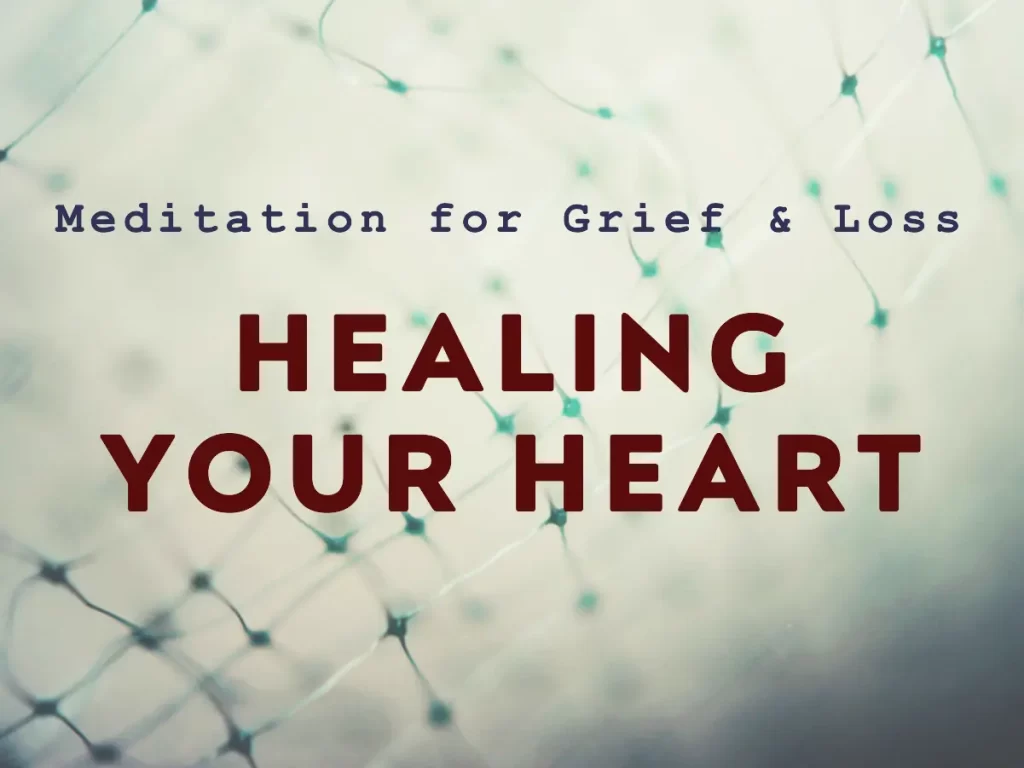If you have lost someone in your life, I am not here to tell you that there is a right or wrong way to grieve. Every person is on their own journey, dealing with loss and grief, trying to make themselves feel better with a gaping hole in the heart.
Sensations surrounding a grieving person after losing a loved one are highly charged and can be depressing. You can use guided meditation techniques to deal with sense of loss, and cope through mindfulness. In such situations, meditating, when practiced effectively, can serve as a valuable practice against sad, angry, and any other negative feelings.
The Heartache of Grief: Understanding the Pain

What is Grief and Loss?
Let’s start with loss, loss is something that is not in your control, however part of life and something that we all must experience in our lifetime. Grief however is the feeling attached to loss. Grief is heavy to your body and mind, and sometimes it can feel like you just cannot get through it. Even a breath can become a burden and waves of grief will keep affecting you throughout your life
The path of grief can also lead you to emotional damage as well as issues related to your physical health. Eating, sleeping, paying attention to those around you and doing mundane everyday tasks can feel impossible. Worry not, this is normal and exactly how loss of a loved one should feel like.
The Stages of Grief: A Journey through Emotion
As you deal with loss and reflect on grief, be mindful of your own journey through it. These are the stages of grieving process that we all go through:
- Denial: when there is so much emotion that you end up not processing any of it and just feeling numb is denial. Some of us act like the loss never happened and reality of the loss does not hit.
- Anger: the next stage is anger at the loss, at the world, at yourself, anything and everything. This is also completely natural because when we can’t control someone leaving us, then we get angry.
- Bargaining: as the anger subsides, you start to bargain. You start to feel that doing something can bring them back or what if you had done something different? This is a way to grieve and powerful way to start dealing with heavy emotions surrounding grief.
- Depression: in this stage, you’re feeling sad and longing for the person or the time you spent with them. Depression is extremely heavy on your heart. You do not feel interested in things that made you happy previously, even getting out of bed can feel like a chore. Don’t be impatient in this stage, let your healing journey run its course
- Acceptance: Finally we reach acceptance. As you move through grief and loss without judgment, you will finally end up at this final stage. You might feel less alone, your heart will still ache for the person, but sometimes the best way to let go is through acceptance.
Statistics on Grief and Its Impact
I have noticed that when we grieving persons look at other grieving persons, it builds their hope of getting better. So here is an outlook on statistics dealing with grief and loss:
- Data shows that 61 million people died in 2023 alone, and each person leaves an average of 5 persons to grieve. That means that there are 305 million people in the world currently grieving the loss of a loved one. You are not alone!
- When grieving, overwhelming feelings that leave a lifelong mark is known as complicated grief. Out of all grieving persons, complicated grief is found in 15% of the population
- The most common form of grief is the loss of a loved one through death, but others also include divorce, losing a job or death of a loved one.
Meditation: A Salve for the Wounded Heart

What is Meditation and How Can It Help with Grief?
Meditation is simply a form of exercise for your mind that deals with purposeful concentration to reach a higher level of spirituality and knowing yourself better. Mindfulness meditation directs your attention to your emotions and does not let you run away from complicated feelings. So, of course, meditation can help you deal with grief and not let you run away.
Mindfulness can help us at a time when shoving your feelings deep down feels like the best thing to do. But, if you do not deal with your grief, then you never get a release or reach the final stage of grieving i.e. acceptance. You will carry that pain with you through life.
The Science behind Mindfulness and Grief Management
Self-compassion is a very useful tool in the grieving process. Grief teaches us that no matter how strong we are in our daily life, there are things that can leave us feeling like the ground has shaken us to our core. At such a time, you will feel the need to bottle emotions with a burning passion because brining to mind the hard emotions takes a lot of courage
The science of mindfulness tells us that going through the hard emotions helps in releasing the grief we carry. It will help people move through grief and bring to mind peace and acceptance. 10 years down the line when you look back at a grieving moment, guided meditation for grief and loss will work to set positive emotions and remove the baggage.
Fact: Meditation can Reduce Stress Levels By 38% (Source: Harvard Study)
Yes, it is a fact that exercise along with meditation can liberate our love for the lost person.
Guided Meditations for Grief and Loss

Finding Peace in the Present Moment
On grief, Jack Kornfield said:
“It takes courage to grieve, to honor the pain we carry. We can grieve in tears or in meditative silence, in prayer or in song. In touching the pain of recent and long-held griefs, we come face to face with our genuine human vulnerability, with helplessness and hopelessness”
As you grieve, you deal with complex emotions and lack the emotional intelligence to process them. What usually happens is you get a rush of complex emotions, and to close your eyes and take a moment can feel heavy because the feelings are so heavy.
But I am here to tell you that in this very moment you can decide to be courageous and deal with these emotions mindfulness is a great tool in dealing with emotions and finding peace in the present
Letting Go of Pain and Embracing Healing
Practicing mindfulness with meditation puts you in the present and lets you heal. Heaping on emotions in your heart and feelings without unraveling them can lead to major baggage in the future.
But, meditation begins by letting go of the pain and embracing your difficult emotions. Grief will want to stick feelings without managing them, but with meditation you feel grief, accept the loss and move on (as much as you can)
Table: Types of Guided Meditations for Grief
| Meditation Type | Why to use? |
| Breathing meditation | Taking deep breaths and imagining grief coming out every time you breathe out is a great way to arise when we’re ready to cope. |
| Transcendental meditation | Meditate on grief to transcend above your mental state and deal with negative emotions. For this meditation, you can join a grief support group and share grief process with others |
| Body scan meditation | This meditation releases pain and tension that is built up in your muscles. To manage the physical pain of grief, body scan meditation puts attention back to releasing built up stress |
| Mantra meditation | Mantras are one way to grieve fully and openly. With a mantra, you can meditate on grief as one emotion that you deal with. Some of the mantras you can repeat are:“Om”, “Om Namah Shivaya”, “I want to fully feel my emotions” and “I permit myself to grieve” |
The Benefits of Meditation for Grief

Emotional Healing and Acceptance
Benefits of meditation for grief is that you allow yourself to heal as time goes on. Emotional healing almost definitely will lead to acceptance and vice versa. This is a healthy way of coping with emotions, which makes you confident of your own fragility.
You make space to feel pain or the kind of ache that affects the heart. Instead of bottling it up and forgetting, meditation has benefits of reducing the grief and its hold over you. Bringing your attention to yourself and healing, instead of things that cannot be controlled, like the health or death of a loved one, also brings you at peace with the situation.
Improved Sleep and Reduced Anxiety
With time, as meditation helps you heal, you will start to experience better sleep and help you feel less alone. When emotions were arriving with the loss, even living would have felt burdensome to you. But, as you dealt with those feelings one by one and tackled them head-on, you will now see that positive changes. Your anxiety around the loss will decrease, you will still ache but you will cherish the pain, instead of feeing low and depressed because of it. Overall, your healing journey through meditation will help you deal with a rollercoaster of emotions, and in the end come out feeling better.
Fact: 76% of Participants Experienced Reduced Grief Symptoms after an 8-Week Mindfulness Program (Source: UCLA Study)
When grieving is done along, the benefits can take longer to be felt, but grieving with others has certain advantages that are much better. The UCLA study found that a person or thing that causes grief can reduce anxiety and depression when thoughts and feelings are shared with others.
There are numerous programs that offer communal support to help people move on and help people navigate through negative and complex emotions. In these programs, a mindfulness teacher will foster feelings without judgment and allow yourself to feel grief with others.
Grief Support: Integrating Meditation into Your Journey
Creating a Meditation Practice for Grief
The feeling of grief is like taking out a fish from the water and asking it to survive. Loss can have detrimental effects on your health, especially if you relied on the person for emotional support. To return to your natural rhythm and deal with waves and gradual decline of grief, you have to make mindfulness meditation a routine in your life
Seeking Professional Support and Grief Counseling
A professional will help you go deeper in dealing with grief. On your own, you can feel that the need to touch certain emotions is not important and therefore your grief will become a burden.
A professional will not allow you to leave anything untouched. You will learn the need to respect our tears, see positive changes in appetite, relax, and settle with your new reality, without a loved one or a job
Building a Supportive Community for Healing
Friends and relatives hold much more importance than you give them. They can become your punching bag and help you relieve yourself of grieving emotions. Some people want to write down their emotions, while others just need to talk. When you need to talk, building a community of support and healing is very important.
Conclusion: Finding Solace in Mindfulness
Your Path to Healing and Acceptance
In this article, we have found that there is no right or wrong way to deal with grief. Every person deals with negative emotions in their own way. Either you develop distance or abstract ideas of numbness, but a filled and heavied heart of grief remains the same.
Although, the loss cannot be reversed or changed, what can change is how we deal with it. The quality of love you surround yourself with, sense of intensity of emotions you deal with, and the process of change in life all lead to positive emotions around grief.
The Power of Meditation for Grieving and Loss
Mindfulness offered by meditation is a great way of teaching yourself that grief is something that happens to everyone. It teaches you to:
- Let yourself grieve
- Let it teach feelings of loss
- Let you get through the complex emotions, instead of avoiding them
FAQ’s:
Yes, meditation is a great tool of managing loss, anxiety, depression and other complex emotions that come with grief
Choose: Choose to feel grief
Connect: Connect with your support system
Communicate: Communicate your emotions
Grief effects your whole body. Your brain, liver, muscles, stomach and even skin is impacted by grief
Grief can leave a mark on you, irrespective of how old it may be, the pain of grief remains. However, grief can either change you for the better or for the worse. Depending on how you tackle your grief, it can make you better at managing emotions or harden you against any feelings
– Get over it
– It has been over 6 months or a year, get over it already
– You look thin or fat
– You look drained of energy
– You could use some food and sleep, maybe both
Mindfulness meditation strategies work wonders in managing grief because they help you break each complex emotion one by one
Yes. Yoga with mindfulness or guided meditation can help you get through grief. It can be used to reduce physical strain of grief on yourself
As you grieve, the bodily sensations that are worth noticing are your heartbeat, breathing rate and blood pressure. These are major indicators of anxiousness that can bring about panic attacks
Grief can:
– Reduce your sleep or decline quality of sleep
– You do not feel hungry or full
– Your digestion is impacted
– You can experience chest pains
– Fatigue can impact your health
– You can have an acne breakout
– Headaches and physical pain are quite common
– An overall disinterest in all things is also common.



